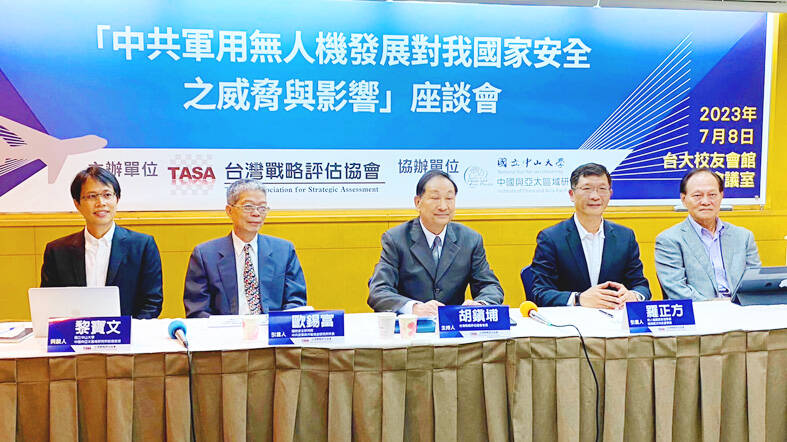If China were to invade Taiwan, it would likely attack by mainly using drones, which have become the face of modern warfare due to their low cost, high efficiency and ability to minimize casualties, former army commander-in-chief general Hu Chen-pu (胡鎮埔) said yesterday.
Hu, head of the Taiwan Association for Strategic Assessment, made the remarks at a seminar hosted by the association in Taipei that addressed the threats to Taiwan’s security posed by Chinese military drones.
The ongoing war between Ukraine and Russia has put drones at the forefront of modern warfare, Hu said.

Photo: CNA
China has been developing drones at a fast pace in the past few years, and has amassed numerous military drones, which it began using to circle Taiwan a few months ago, he said, adding that the drones that China flew around Taiwan all had combat and reconnaissance capabilities.
Noting that drones are relatively low cost, highly efficient and do not cause any casualties to the user’s side, Hu said that if China were to invade Taiwan, drones would be its primary weapons of choice.
Ou Si-fu (歐錫富), a research fellow at the Institute for National Defense and Security Research, said China has been regularly employing drones in its military activities since September last year.
The models it has typically used have included ASN drones used by the Chinese People’s Liberation (PLA) and Army Rocket Force, the BZK-005 drone used by the navy, the GJ-1 and WZ-7 drones used by the air force, and the JWP-02 drones used by the Army Rocket Force, he added.
Drones have surveillance, reconnaissance, deception and strike capabilities, and have become ubiquitous in modern warfare, he said.
As China is not part of the Missile Technology Control Regime, it has established itself as a major drone supplier, which is something the world should pay close attention to, he said.
Drones have been widely incorporated in combat beyond the range of target acquisition, hence the nickname “eyes in the sky,” Lo Cheng-fang (羅正方), CEO of Geosat Aerospace & Technology Inc said at the seminar.
Drones with combat and reconnaissance capabilities are to be the focus of Taiwan’s domestic drone development over the next five years, he said.
The Chien Hsiang anti-radiation loitering munitions developed by the state-run weapons developer Chungshan Institute of Science and Technology would be a formidable deterrence in electronic warfare, he added.

‘DENIAL DEFENSE’: The US would increase its military presence with uncrewed ships, and submarines, while boosting defense in the Indo-Pacific, a Pete Hegseth memo said The US is reorienting its military strategy to focus primarily on deterring a potential Chinese invasion of Taiwan, a memo signed by US Secretary of Defense Pete Hegseth showed. The memo also called on Taiwan to increase its defense spending. The document, known as the “Interim National Defense Strategic Guidance,” was distributed this month and detailed the national defense plans of US President Donald Trump’s administration, an article in the Washington Post said on Saturday. It outlines how the US can prepare for a potential war with China and defend itself from threats in the “near abroad,” including Greenland and the Panama

The High Prosecutors’ Office yesterday withdrew an appeal against the acquittal of a former bank manager 22 years after his death, marking Taiwan’s first instance of prosecutors rendering posthumous justice to a wrongfully convicted defendant. Chu Ching-en (諸慶恩) — formerly a manager at the Taipei branch of BNP Paribas — was in 1999 accused by Weng Mao-chung (翁茂鍾), then-president of Chia Her Industrial Co, of forging a request for a fixed deposit of US$10 million by I-Hwa Industrial Co, a subsidiary of Chia Her, which was used as collateral. Chu was ruled not guilty in the first trial, but was found guilty

A wild live dugong was found in Taiwan for the first time in 88 years, after it was accidentally caught by a fisher’s net on Tuesday in Yilan County’s Fenniaolin (粉鳥林). This is the first sighting of the species in Taiwan since 1937, having already been considered “extinct” in the country and considered as “vulnerable” by the International Union for Conservation of Nature. A fisher surnamed Chen (陳) went to Fenniaolin to collect the fish in his netting, but instead caught a 3m long, 500kg dugong. The fisher released the animal back into the wild, not realizing it was an endangered species at

DEADLOCK: As the commission is unable to forum a quorum to review license renewal applications, the channel operators are not at fault and can air past their license date The National Communications Commission (NCC) yesterday said that the Public Television Service (PTS) and 36 other television and radio broadcasters could continue airing, despite the commission’s inability to meet a quorum to review their license renewal applications. The licenses of PTS and the other channels are set to expire between this month and June. The National Communications Commission Organization Act (國家通訊傳播委員會組織法) stipulates that the commission must meet the mandated quorum of four to hold a valid meeting. The seven-member commission currently has only three commissioners. “We have informed the channel operators of the progress we have made in reviewing their license renewal applications, and